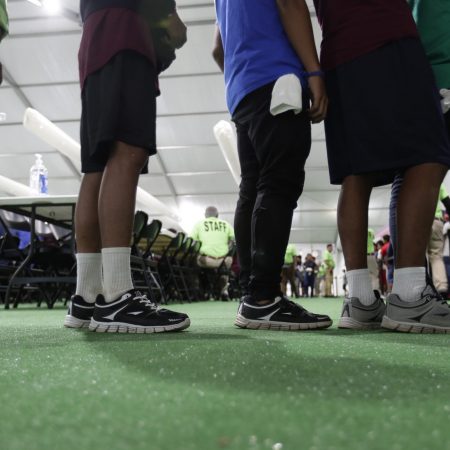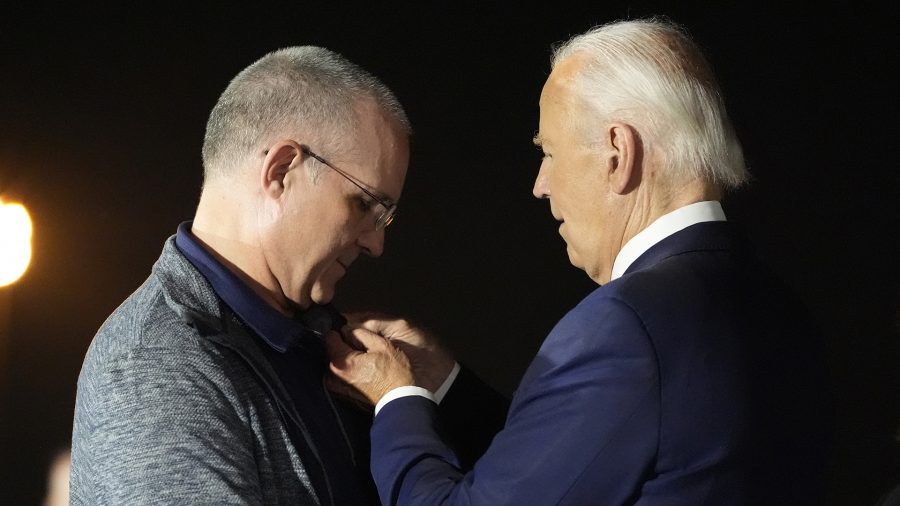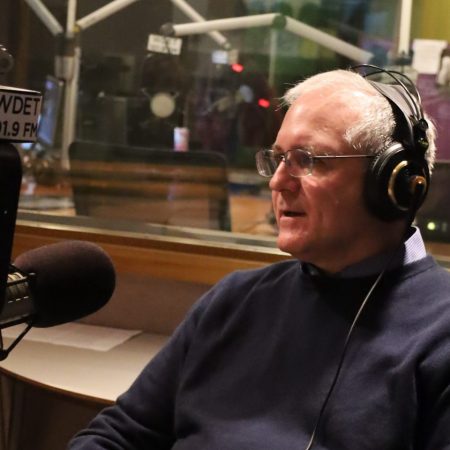Michigan Immigrant Rights Center claims Trump avoiding judge’s order, cutting funds that help kids in court
Tens of thousands of immigrant children — including hundreds in Michigan — came to the U.S. fleeing gangs, human trafficking or trying to re-unite with family members.
Nonprofit groups supplied attorneys to help keep the children here, some so young they need a teddy bear to calm them when they testify in immigration court.
But the Trump administration is halting federal funding for the effort, apparently defying the courts to do so.
That’s hitting the nonprofit Michigan Immigrant Rights Center (MIRC) hard.
Christine Sauve, manager of policy and communication for MIRC, told WDET the group has to make severe cuts in key areas.
Listen: Michigan Immigrant Rights group shares repercussions of federal funding cuts
The following interview has been edited for clarity and length.
Christine Sauve, Michigan Immigrant Rights Center: We did lose federal funding for two of our programs. One is the help desk in immigration court. We had previously received a stop-work order on that program. There was a court order for us to return to services and then just last week, the federal government terminated the contract completely. There is continued litigation on that. However, the funding has been terminated for now. The other program is our unaccompanied children’s program. We provide legal representation and “Know your rights” information to all immigrant children in Michigan in court proceedings. Unfortunately, that program had received a stop-work order. Then it was lifted too. But the contract was terminated at the end of March. There was litigation filed in that case as well. And unfortunately, to date, the Trump administration has not followed the court’s orders. Payment has not been made for those services, and due to the financial pressure from the loss of both of those contracts, we’ve had to lay off 72 staff in our five offices across the state. We will still have our small help desk team, five individuals operating outside of the Detroit immigration court. We have 49 staff remaining distributed in our five offices across the state.
Quinn Klinefelter, WDET News: In terms of what the administration is supposed to do according to the courts, have they ordered them to fund you guys and they are simply not?
CS: In the unaccompanied children’s case, the hearings are ongoing. But after the last judge’s order to return to services, the government has not complied with those orders. There has been no payment and no communication with the contractor. We are a subcontractor for the services. There’s been no communication, no follow through, no intention shown to provide payment for the services. So without the federal funding coming in we were left with very difficult pressures to continue our services as best we can. What we do know is that under the Trafficking Victims Protection Reauthorization Act, a bipartisan act passed by Congress decades ago, it acknowledged the unique vulnerability of children and actually codified the federal government’s obligation and responsibilities to ensure that unaccompanied children have legal representation so they’re not facing that risk of deportation without due process, without a chance for a fair hearing in court.
“Most unaccompanied children are eligible for permanent status and other forms of relief under current U.S. law. But they can’t access that relief without an attorney to help make their case in court. It’s so heartbreaking because children just cannot meaningfully navigate immigration court alone. We don’t expect children to do that in any other court process in America.”
– Christine Sauve, Michigan Immigrant Rights Center
There was a recognition that it could not be a fair hearing if the child did not have an attorney or representation. Most unaccompanied children are eligible for permanent status and other forms of relief under current U.S. law. But they can’t access that relief without an attorney to help make their case in court. It’s so heartbreaking because children just cannot meaningfully navigate immigration court alone. We don’t expect children to do that in any other court process in America.
QK: At times some unaccompanied kids try to get a sponsor in the U.S., perhaps a family member, after they arrive here. There’s concerns from some sponsors now about doing that going forward, because some of their own personal information could be revealed that didn’t used to have to be. How is that process unfolding?
CS: The Trump administration had authorized information-sharing between agencies. There’s something known as the “foundational rule” for the unaccompanied children’s program. It previously stated that information about sponsors’ immigration status could not be shared with other federal agencies, in particular Immigration, Customs and Enforcement. This administration has changed course to permit sharing of sponsor immigration status with law enforcement, specifically for the purposes of achieving their goals of mass deportation. They are looking at all avenues to do so. And unfortunately, it affects some of the most vulnerable of our community members, the children who are placed in those homes. They’ve been placed with family or relatives that they know and trust. Removing the sponsor would affect the health and outcomes for the child as well. So that is challenging our work right now.
QK: With your current situation, while you still watch what’s going on with the litigation that’s underway, where do you guys go from here? How badly understaffed are you? Is it going to affect your mission tremendously as you go forward?
CS: The capacity will be lowered but we will not stop representing the children that we currently have in our caseload. We currently have 800 cases that are still proceeding. We’ll have a small team focusing on those cases for the next nine months to complete as many of them as we can. But unfortunately, we won’t be able to accept any new children’s cases for the foreseeable future. We have done a fair amount of fundraising. But there’s a reason that public funded services exist and it is because often other entities are unable to provide that level of funding. We have been very busy over the past couple of months reaching out to as many foundations and private donors as possible to raise the funds to have this small team continue over the next nine months. I don’t think with the current funding we have available at the moment we could continue that beyond nine months.
Trusted, accurate, up-to-date.
WDET strives to make our journalism accessible to everyone. As a public media institution, we maintain our journalistic integrity through independent support from readers like you. If you value WDET as your source of news, music and conversation, please make a gift today.
Lorem ipsum dolor sit amet, consectetur adipiscing elit. Ut elit tellus, luctus nec ullamcorper mattis, pulvinar dapibus leo.
The post Michigan Immigrant Rights Center claims Trump avoiding judge’s order, cutting funds that help kids in court appeared first on WDET 101.9 FM.












